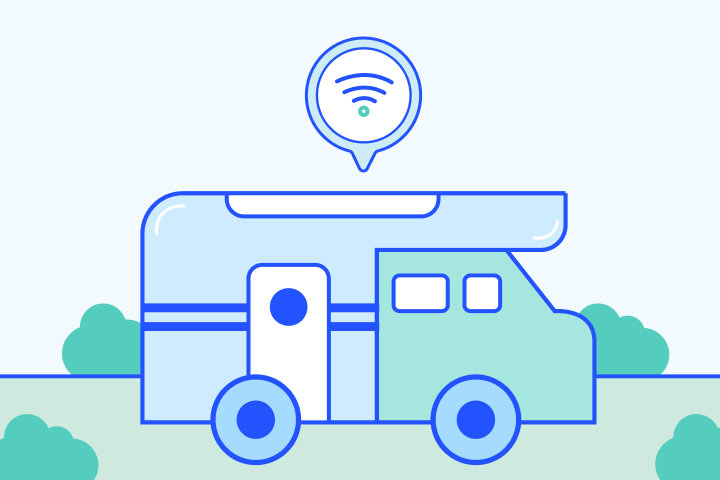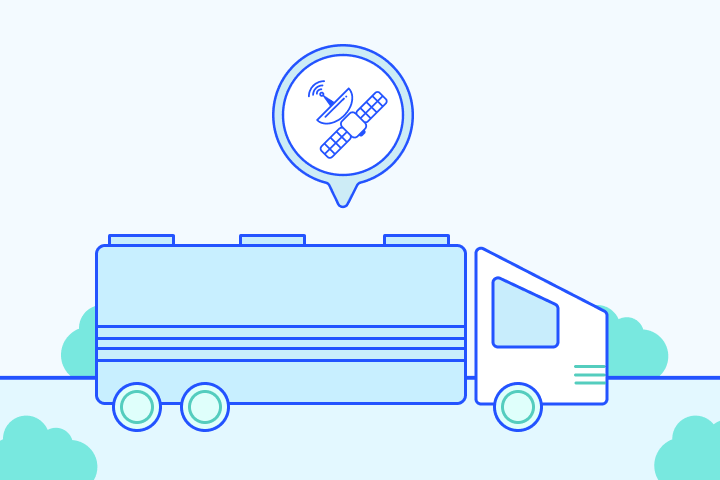Best RV Internet & WiFi Options

HighSpeedOptions prides itself on providing honest, quality content. While we may be compensated when you make a purchase through links on our site, all opinions are our own. Here's how we make money.
Table of Contents
Traveling around in an RV is a fantastic way to explore and see the world. But just because you’re on the road doesn’t mean you can’t have access to fast internet. Whether you need it for work, staying in touch with family and friends, or getting directions, finding ways to stay connected can be one of the many challenges of RV life. Luckily, several internet providers offer solutions tailored for RVers. We’ve compiled a guide to finding the best RV internet & WiFi options to keep you connected while on the move.
Key Takeaways
- Finding quality internet service while exploring the world in your RV can be challenging.
- Satellite internet is a great option for RVs, but there are other RV internet options.
- When you have found internet service for your RV, be sure to see these tips to get the most out of it.
- It’s often difficult to find internet service that’s portable and affordable. Check out our alternative ideas for internet service.
- Internet options can vary in cost while on the road. See what’s free and what’s not.
- There’s a lot to consider. Here are a few final thoughts on RV internet options.
- Have more questions about internet service for your RV? Check out our RV Internet FAQs for more information.

The Challenge of Mobile Internet for RVs
When you’re on the road, your internet access needs don’t change. It’s just as critical as it is under normal circumstances. You still need internet service to work remotely, stream movies and live TV, directions and reservations, and even “road-schooling” your kids.
Finding reliable internet access while traveling around in your RV can be very frustrating, but there are some solutions that can provide the connectivity you need.
If you’re living the RV life, you’ll need to get accustomed to wireless internet options and understand that the speed and stability of your internet connection will change day to day. Here are several solutions for reliable internet connections while on the road.
Best Internet for RV
Though figuring out an internet situation while living in an RV may require more effort, there are a few main options that work for most:

Mobile Hotspots for RVs
For those on the road full-time, cellular data can be a pretty appealing option. Cellular data plans, or hotspots, are useful for when you find yourself far from reliable and secure public WiFi sources.
The Wireless Home Internet from EarthLink, despite its name, might be an ideal mobile solution for RVers. It was designed for users in rural areas as an alternative to satellite internet and DSL internet. But it is a cellular hotspot that can be used on the road, as long as you have 120V outlets in your RV and are within a 5G cellular network.
The device, provided by EarthLink, acquires the fastest cellular signal possible, depending on what’s available where you are. It can operate on 4G LTE and 5G networks, offering flexibility as you travel in different parts of the country. Plus, you can add multiple devices to it, but overall speed may slow as more devices are connected to the hotspot.
- Best internet protection
- Unlimited data included
- No credit checks
One thing to keep in mind with mobile hotspots is that the provider may set data caps. It may be more cost-efficient to spring for an unlimited plan if one is offered.

RV Satellite Internet
Satellite internet has become an increasingly popular option since Starlink internet service opened the doors to greater speculation about using satellites for high-quality internet worldwide. Because of its portability and wide availability, many travelers install satellite internet service in their RVs. This can be a great option if you plan on staying in the same place for a long time.
Starlink recently announced its portable satellite internet service, called Starlink Roam, that is ideal for the RV lifestyle. You still need to buy the equipment and the monthly service fee is slightly higher than Starlink’s home satellite internet service. While it is an excellent solution for digital nomads, keep in mind that Roam will not work while you are in motion and the service is subject to availability.
- Fast satellite internet
- Ideal for rural areas
- Up to 3x faster than DSL*

Public/Campground RV WiFi
Wherever you go, you almost always have the option of connecting to a public WiFi—whether it’s in a campground, Starbucks, or public library. Using public WiFi can be a great way to save on internet costs, especially if you plan to stay in campgrounds and RV parks and don’t want to wander too far into the wilderness.
Still, campground WiFi has its drawbacks. Often, these networks are slower and less reliable, and there’s a good chance you’ll find it difficult to join video calls or stream TV. Since it is a public WiFi, be sure to take the necessary safety and security precautions to protect your device and your information.

RV WiFi Hotspots
Many internet providers have nationwide hotspots that you can access through the service you have registered at your home address. Although they likely aren’t available in the wilderness, they are readily available in cities and towns throughout the country. For instance, Xfinity internet has over 8 million hotspots nationwide through which you can access the internet. Keep in mind that these hotspots are similar to public WiFi, so use caution to keep your device and data secure.
Tips to Get the Most Out of Your RV Internet
Even though establishing an internet connection while traveling in an RV can feel like a hassle, many have found great workarounds. Luckily, there are a few ways to help connect and maintain your internet service.
- Subscribe to unlimited data
As mentioned before, many RVers spring for an unlimited data plan even if it’s a bit more expensive. These expensive plans can actually cost less than paying for data above and beyond your provider’s data limits. If you know that you’ll consistently need more data than the limit allows, it’s almost always less expensive to go with an unlimited data plan.

- Get a cellular signal booster
A cellular signal booster is a device that increases the signal on a device from one to two bars of service. Boosters are helpful when your connection is poor, and they can mean the difference between being able to access an online map and being left to find your way to a campsite on your own.
However, boosters can often cost up to $500. They can also work against your signal in certain situations. If you decide to get a booster, we recommend turning it off when the signal is strong enough on its own.
- Get a WiFi extender
A WiFi extender, or repeater, is another gadget that can help speed up your connection, especially when you’re using a campground WiFi. Once it’s set up, an extender will rebroadcast the WiFi signal it’s receiving inside your RV, creating a stronger and faster signal. Be sure to run an internet speed test afterward to gauge the performance of your internet connection.
An extender can be a great way to boost your wifi signal while using a public network, and several RV manufacturers integrate them into their models. The WiFi extender becomes a part of the public WiFi network, so we again urge caution and security to protect your privacy and information.
Alternatives for RV Internet
If you’re new to RV life, or aren’t sure that a cellular plan, public WiFi, or satellite internet is right for you, there are still a few internet options that are available for you:
Co-working spacing in urban areas
Most cities and urban areas have some version of co-working spaces where you can rent a desk for a few days while you’re in town. This can be a great way to use high-speed internet for work or travel plans, but it isn’t a great long-term solution.
Borrowing bandwidth from friends when you visit
If you happen to swing by a friend’s city, you may be able to borrow some of their internet while you’re in town. This could be more secure than using public networks and would probably give you a great connection during your stay.
Subscribe to Cable or DSL provider at a campground
If you’re planning on staying at a campground for an extended time, you may have the option to subscribe to their cable internet or DSL provider. It might be a hassle to set up but this will give you secure, reliable, and high-speed internet during your stay.
To set up your service, you’ll need to pay the installation and monthly fee. Some campgrounds already have cable installed, making it even easier to simply pay the monthly fee for the rest of your visit.
RV Internet & WiFi Costs
As you can probably guess, the monthly costs to get internet service while on the road in your RV can vary. You can find free services, such as free public WiFi at a campground. However, we strongly encourage you to take internet security precautions when accessing any public WiFi.
Internet provider hotspots and mobile hotspots are included in your monthly bill, which can be anywhere from $20 to $200 or more per month, depending on the provider and type of internet connection. However, some mobile providers may put a data limit on your hotspot.
And finally, the Starlink Roam satellite internet service for RVs starts at $150 per month, plus the one-time equipment charge of over $500.
Stay Entertained in Your RV with Mobile Games
Long stretches on the road can get dull, even with a stable internet connection. A fun way to pass time in your RV is by playing mobile game apps, which are accessible anywhere without bulky equipment.
Here are some great mobile game genres for RVers:
- Play to earn apps like Cosmic Rewards allow users to earn real rewards like Amazon gift cards and crypto just by playing casual games.
- Social games like Words With Friends 2 allow you to chat and compete with friends while improving your vocabulary.
- Classics like Microsoft Solitaire offer different modes and challenges for the popular card game.
- Logic puzzles such as Sudoku flex mental muscles with number and word challenges.
- Trivia games like Trivia Crack let you test your smarts against other players.
Final Thoughts about RV Internet & WiFi Options
While you’ve got options to access the internet while enjoying the nomadic lifestyle, there are a few things to keep in mind. Availability of services will depend on your location. Cellular data networks aren’t available everywhere and can be slower in remote areas. Public WiFi will depend on the type of internet it’s connected to and how many others are using it at the same time.
Satellite internet may be the best choice for availability and reliability and worth serious consideration if you spend a significant amount of travelling in your RV. It is the most expensive solution offered here and its performance can be affected by severe weather, but it will provide the fastest internet speeds and most flexibility.

RV Internet FAQs
Though you may be able to use a HughesNet internet or Viasat internet for your RV if you’re staying in one place for longer than a few days, it isn’t a great solution in general. Each time you change locations, you’ll need to pack it up and then set it up and calibrate it for optimal performance.
Even if they both get the job done, how you travel and what your goals are may impact whether you choose a cellular hotspot or a satellite. A cellular hotspot is great for RVers who don’t stray too far from civilization and need fast speeds.
On the other hand, satellite internet is great for travelers who like to stay in remote places that most internet providers don’t cover. Since they tend to be slower, satellites can also be a great option if you mainly use the internet for less-intensive activities like navigation or sending emails.
Naturally, the cost of getting internet in your RV can vary based on what you’re using, how often you need it, and whether you purchase any gadgets like boosters or extenders. But, since it’s the most common option, taking a look at cellular plans can give you a good idea of what to expect.
For cellular data, you’ll need to pay somewhere between $150-$500 for your hotspot device in addition to your data plan itself. If you don’t absolutely need high-speed internet, it may be enough to get a hotspot on your phone, which you can use to connect to other devices when free WiFi isn’t available.
Yes! Starlink announced a satellite internet service for RVs in mid-2022. With the equipment purchase and an additional $25 per month, you can hit the road and not lose connectivity with Starlink’s new RV satellite internet service. Keep in mind that Starlink is currently taking reservations, but equipment may not ship until 2023. You will be notified when your equipment is ready to ship.
Find providers in your area
Table of Contents










